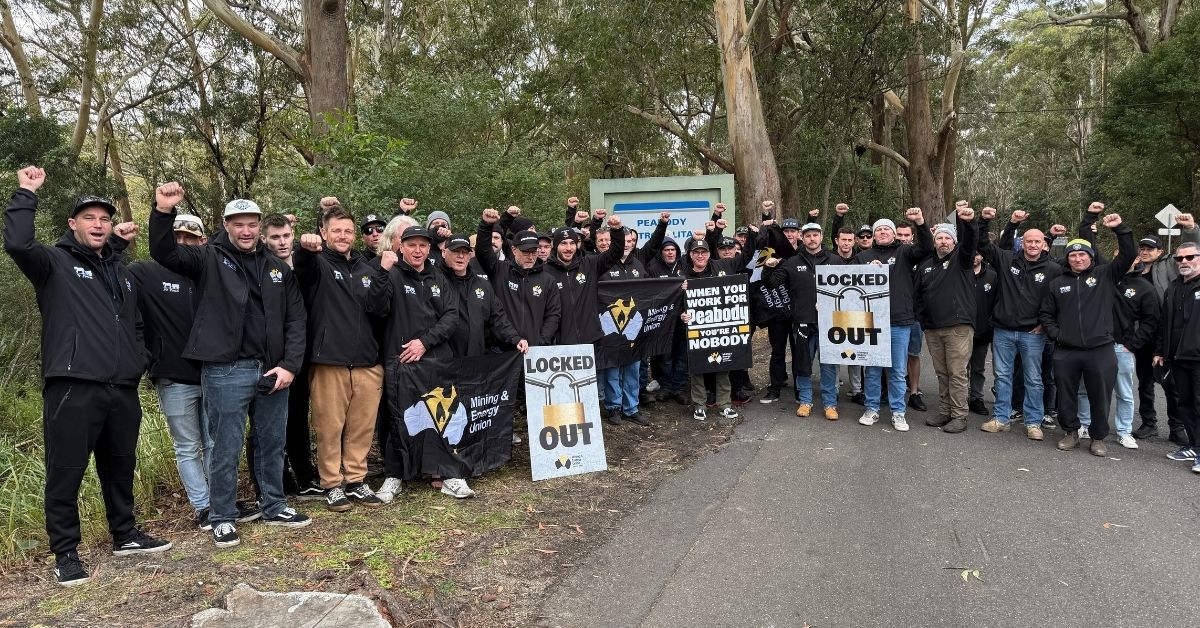August 29, 2025
After a six-week dispute on the gate and five years in the courts, MEU members at Peabody’s Metropolitan mine have delivered a double victory – securing real pay increases in a new enterprise agreement and a landmark High Court ruling that strengthens job security across the industry.
A deal won the hard way
Striking Helensburgh miners have voted up a new enterprise agreement that delivers significant pay increases and defends core job-security protections – bringing to an end a tough six-week dispute.
Negotiations broke down on Wednesday, 18 June when Peabody locked MEU members out for three weeks in retaliation for one-hour stoppages. Members responded with rolling strike action and a determined picket at the mine entrance. Unity held, an in-principle deal was reached, and members endorsed the agreement by a strong majority.
South West District Vice President Mark Jenkins said the result shows what happens when workers stand together:
“Peabody leant hard on the MEU members at Metropolitan, but they stood firm to win this new agreement. Peabody’s lockout was disgraceful, but it only strengthened the resolve of the miners. The best – and only – way to stand up to the hardball tactics of mining multinationals is to stand together through our union.”
Helensburgh site delegate Matt Potter said members made sacrifices to defend a principle:
“Being locked out and then on strike put real financial strain on many of our members, but now was the time to stand up for job security in the coal industry. I’m immensely proud of the unity and strength of the Helensburgh lodge and how we stood up for our rights and conditions.”
What the EBA delivers
● Pay rises that matter: 5% per year over a three-year term, clawing back ground after pay freezes and high inflation.
● Job security in writing: Peabody must lift permanent and fixed-term employment this year and staff to full manning levels before using contractors beyond ancillary work.
● A clear signal: Direct, secure jobs can’t be quietly replaced by outsourced labour when ongoing work exists.
A legal line in the sand
On the legal front, the High Court of Australia has confirmed that the sacking of twenty-two underground miners in 2020 was not a case of genuine redundancy. The Court upheld the Fair Work Commission’s findings that those workers could have been reasonably redeployed to similar roles being performed by contractors Menster and Nexus. Peabody has now failed three times to overturn that ruling.
MEU General Secretary Grahame Kelly said the decision sets an important precedent:
“For over five years, these workers have fought to protect the very principle of job security in the mining industry. The High Court has been clear: permanent workers cannot be removed in favour of contractors through dodgy corporate restructuring. In a sector where labour hire is too often used to undercut pay and conditions, this matters.”
Why the High Court win matters beyond Helensburgh
● Redundancy must be real: If comparable work exists, whether done in-house or by contractors, employers must look at redeployment.
● Contracting is not a loophole: Shifting work to third parties does not make permanent jobs disappear for legal purposes.
● Stronger leverage at the table: When the law backs redeployment and secure jobs, workers have greater power to secure fair agreements like Helensburgh’s EBA.
The thread that ties it together: secure, well-paid work
The EBA victory and the High Court judgment tell one story: when miners are organised, persistent and united, they can win – on the gate and in the courts. The new agreement puts real money back into workers’ pockets and keeps the permanent workforce at the heart of the mine. The Court’s ruling makes it harder for any employer to pretend a job is gone when the work rolls on.
These wins also rebut a tired corporate playbook: starve wages, casualise core work, and cry “redundancy” while the same tasks are outsourced. Helensburgh miners have shown there’s another way – stand together, hold the line, and insist on secure jobs with fair pay.

